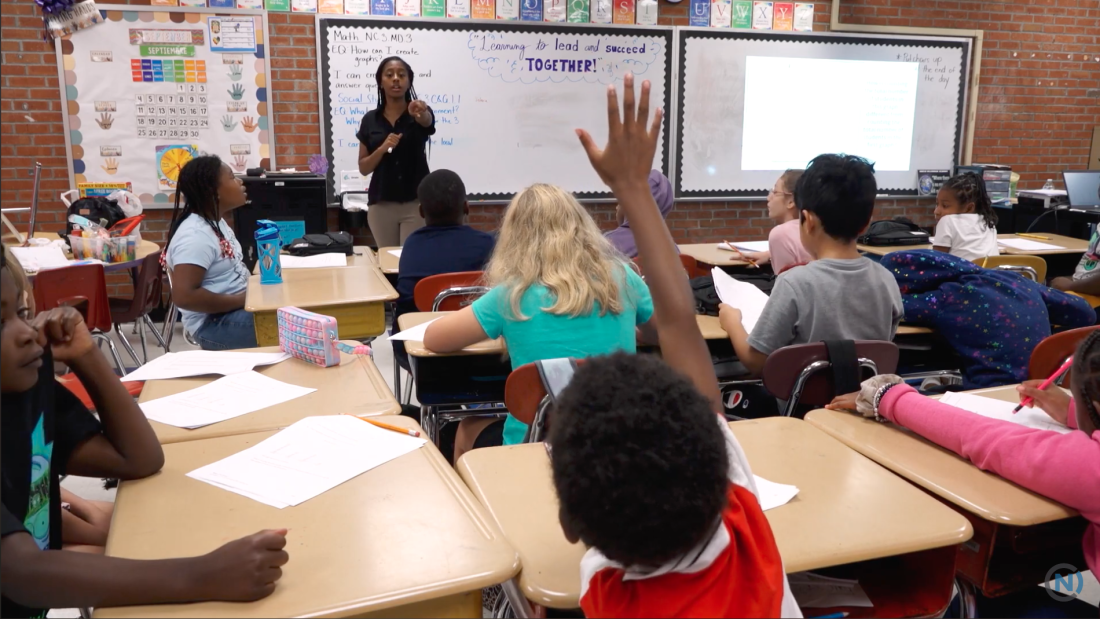Teacher Recruitment and Retention Blog
Everyone agrees that we need more teachers and that good teachers are critical to the state’s ability to train our workforce and produce our citizenry. There are strategies for teacher recruitment and retention that must be state-based. However, local innovations are critical to our collective success in addressing some barriers.

The Challenge
Recruiting and retaining public school teachers is not a new challenge across North Carolina. However, like so many other challenges facing the state, the COVID-19 pandemic exacerbated the issue. Many already working in education chose to take early retirement during the pandemic. Still others, possibly burned out from online learning and the many challenges associated with it in 2020 and 2021, chose to leave the field and pursue new careers. As one principal in Durham Public Schools noted, “If you are going go into education… it is going to be a sacrifice.” Nationally, over 300,000 teachers left the profession between February 2020 and May 2022.
Of course, other stressors for educators made recruitment difficult, even before the pandemic. One of the most commonly cited by those leaving the field was the low pay. The pay also serves as a barrier to entry for many would-be-educators, including those who might have a passion for teaching. Lack of exposure or encouragement for the path to teaching may also be a barrier to potential educators.
The Solution
Edgecombe County, in eastern North Carolina, has been implementing a program over the past six years to “grow their own teachers.” The idea is simple – combat teacher recruitment and retention issues by giving current students the post-secondary training and resources they need to come back and teach in Edgecombe County schools. Like some other rural school districts, Edgecombe County has seen annual teacher turnover rates of over 20% between 2006 and 2018. To address this issue, the district implemented the Scholar-Teacher Program to recruit, train, and retain new teachers from current high school students. The program recruits rising high school juniors into a three-year program at Edgecombe Early College High School. There, students take classes designed to help them learn the basics of teaching. They graduate from the program with their high school diploma and an associate degree. If a student is still passionate about becoming a teacher, they can apply for up to $30,000 in scholarships from the program to pursue their bachelor’s degree and become teachers. In return, students promise to return to Edgecombe County to teach for at least three of their first seven years in the profession. Another requirement of the program is a 200-hour internship completed by shadowing other teachers in the classroom.
If students choose not to pursue a career in education after graduating high school, they still graduate with an associate degree that helps them enter college with some credits and succeed in other professions. The program is a win-win.
Another issue plaguing teachers and preventing successful recruitment is the rising cost of home prices. When a school district doesn’t have housing affordable for its teachers within commuting distance, it creates another barrier to entry for teaching in that district. Buncombe County Schools, facing large housing cost increases as more people move to the Asheville area, have created housing units restricted to and affordable for their teachers. The school district partnered with Asheville City Schools, State Employees Credit Union and the local Eblen charity to finance the 24-unit Williams-Baldwin teacher campus in West Asheville. SECU provided a 15-year, interest-free loan to the district to finance the project. When first opened in 2017, the complex rented the 2-bedroom, 2-bathroom units for $900/month, exclusively to new teachers, as a way to recruit new hires to the area. Today, when vacancies open up for an apartment, they are filled almost immediately. Teachers living in the apartments say that the affordability of these apartments has benefits that spill over into the classroom as well. Having to focus less on their financial situation, they are better able to focus on their work and provide better education to their students.
The Players
Support for the Edgecombe County Scholar Teachers program comes from a variety of organizations. First, the Edgecombe County Public Schools and Edgecombe Early College High School play a large role in this program. In addition, Edgecombe County Community College provides students with general education requirements and other prerequisite classes they need before attending a four-year university for their bachelor’s degree. The program’s main cost, scholarships provided to graduating students, is funded by donations from community members and local businesses. The program has been able to raise enough money to create a 501(c)(3) nonprofit foundation to handle donations and is currently in the process of creating an endowment that would fund the program moving forward. The program’s first graduates made their way back to Edgecombe County Schools for the 2022-2023 school year.
The Promise
Everyone agrees that we need more teachers and that good teachers are critical to the state’s ability to train our workforce and produce our citizenry. There are strategies for teacher recruitment and retention that must be state-based. However, local innovations are critical to our collective success in addressing some barriers.



